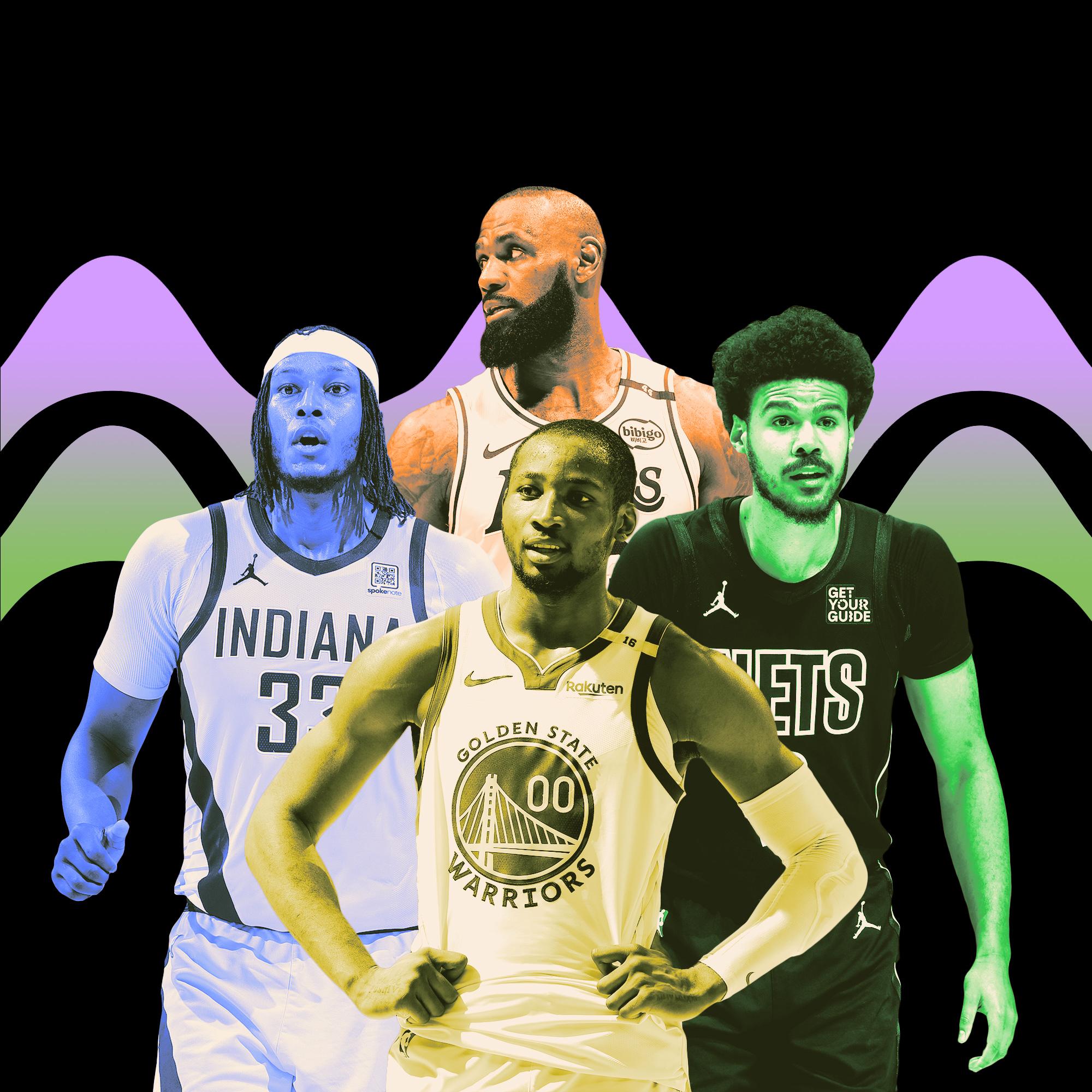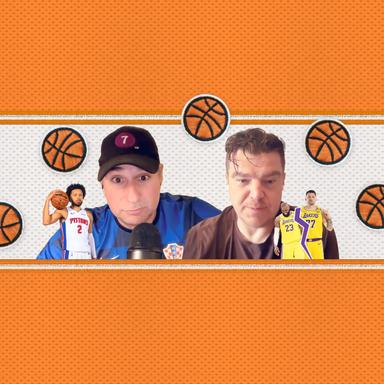Free agency isn’t dead, it’s just downsizing. This NBA offseason made that much clear, as teams adapt to life under the league’s dual aprons. There’s no longer any real cap space to be found, and thus no real market for free agents either. The biggest outright signing for a player joining a new team this summer came in the form of Myles Turner’s four-year, $107 million stunner with the Bucks. In order to even make that possible, Milwaukee stretched and waived the contract of a future Hall of Famer and ate $113 million in the process.
Teams that weren’t willing to take on unprecedented levels of dead money have operated on a much smaller scale. So much of the movement around the league has come from teams making the most of the midlevel exception (starting at $14 million) or even less, making free agent headliners out of Dorian Finney-Smith and Bruce Brown. Forget the package megadeals that used to shuffle superstars around the league; this summer is for the diehards, as teams work the margins of the margins to find whatever talent they can to patch critical gaps in their rotation.
In this cap environment, even the smallest signing can make a difference. Here are six with a chance to move the needle:
Guerschon Yabusele, New York Knicks
Two years, $12 million
Not watching the Philadelphia 76ers last season was an act of self-care. The vibes were horrendous, the basketball was worse, and a theoretically promising team spent more time circling the drain than playing for anything at all. Yet if you did pass on all that, you likely missed out on Yabusele’s delightful, bludgeoning return to the NBA—some six years after he washed out with the Celtics. Basketball took Yabu to professional leagues in China, France, and Spain. The considerable growth in his game brought him back, and now the Knicks will reap all the benefits.
Long-range shooting has clarified so much for Yabusele. His rumbling drives to the basket work even better against a closeout. Building out his range gives him more places to be on the floor, and fewer where he would get in the way. Suddenly, all of the funky, tweener elements of Yabusele’s game feel like real assets. He’s burly enough to play the 5, but agile enough to hold down the 4. That’s a perfect addition for a New York team that, frankly, just needed more options. Yabusele is the kind of backup who gives the Knicks more ways to play, and that’s worth far more than the taxpayer midlevel exception.
Davion Mitchell, Miami Heat
Two years, $24 million
It took several years for Mitchell to establish himself as something more than a situational stopper, but everything started to click last season—first as Toronto’s fill-in starting point guard, and then as a critical part of Miami’s playoff push. His handle was finally tight enough to actually run the point, and a surge in playmaking followed. Mitchell’s jumper, which had long held him back, cashed during his time with the Heat at an incredible 45-percent clip. With that came a certain plug-and-play ease; if Mitchell’s shooting holds, he’ll open up all kinds of lineup possibilities for Miami.
Re-signing a player with that type of potential to this type of deal is a no-brainer. That’s below-market value for a starting guard, and the last we saw Mitchell he was absolutely a starting-caliber guard—even if Norm Powell’s arrival in Miami winds up nudging him into a bench role next season. Yet at the same time, it’s a great deal for Mitchell to lock in a two-year deal that will more than double his career earnings. The market might have been more robust for Mitchell if he was able to court offers in unrestricted free agency, but as it stands, everybody wins. The Heat help yet another “second draft” candidate to play the best basketball of their career, and Mitchell doubles down on a situation that clearly suits him. Players like Mitchell don’t just find a home in the NBA—they make one.
Luke Kennard, Atlanta Hawks
One year, $11 million
Only one player in the league has ranked in the top 10 in 3-point percentage for five years running, and the Hawks just picked him up. Kennard’s defense (or lack thereof) is still a problem, but it’s distinctly less of a problem on a team that employs Dyson Daniels and Nickeil Alexander-Walker to cross-match however necessary, with Onyeka Okongwu and Kristaps Porzingis lurking behind.
At an absolute minimum, Kennard is a clear upgrade over the Garrison Mathews–types Atlanta has tried out on the wing. And more realistically, Kennard could give the Hawks more than Bogdan Bogdanovic did in an off year last season. Kennard not only is a knockdown option on the catch, but also a legit option to run pick-and-roll or facilitate one action to the next. He may not have the two-way flexibility of some of his fellow Hawks, but he very much fits the wheel-and-deal vision of a Quin Snyder offense, where one action builds into the next until the defense breaks.
It’s a great basketball fit for a Hawks team that’s making a hard push in the East—and a low-risk signing in terms of Atlanta’s financial outlook. The Hawks are still figuring out what they have in Jalen Johnson and Zaccharie Risacher, and have enough give in their books to take chances on players like Kennard and Porzingis before the heavier financial commitments kick in. It’s a smart play, and one made possible by the fact that the Hawks were able to acquire Alexander-Walker in a sign-and-trade, preserving their midlevel to give one of the best shooters in the league a one-year balloon payment.
Trendon Watford, Philadelphia 76ers
Two years, $5.3 million
Watford has spent the last few seasons quietly making winning plays for Portland and Brooklyn teams that never really had much to compete for. This season could be an introduction of sorts, to all but the most depraved League Pass junkies. Will the Sixers actually be good? Who even knows anymore. Yet the fact that they might at least try to be—to whatever extent Joel Embiid and Paul George’s knees allow—should raise their profile, and bring more attention to all of the little things Watford does so well.
He can knock down shots (especially when he gets to work off of a real creator), he’s a reliable all-around defender who switches well in coverage, and he casually makes productive, connecting passes that other role players simply don’t. And the Sixers just signed him for the minimum. Watford isn’t quite up to Yabusele’s level, but he’s a great bargain replacement under the circumstances as Philly looks to reset its rotation and expectations. Watford’s biggest challenge isn’t fitting in with a more competitive team—it’s staying healthy enough to pay off everything he already does well.
Tyus Jones, Orlando Magic
One year, $7 million
What a summer it’s been for the Magic, who made a big play for shooting in trading for Desmond Bane and a quiet move for ballhandling by signing Jones. This is a team that struggled to simply get into its offense last season; injuries compounded the quirks of Orlando’s roster, to the point that starting the steady-handed Cory Joseph wound up paying serious dividends. Jones is a continuation of that theme, executed at a higher level. You get the same organizing value from Jones that you would from Joseph, but with more pop, younger legs, better shooting, and even cleaner playmaking. If the Magic finally break through to make a deep playoff run, the Bane acquisition will be a critical reason why. But signing Jones to clean things up for the second unit probably will, too—if in subtler ways. The Magic already had the collective talent and defense to be a real threat. They just needed a hand with the logistics of running a team, which happens to be Jones’s specialty.
Ajay Mitchell, Oklahoma City Thunder
Three years, $8.7 million
Just because you’re not quite ready for rotation minutes in the NBA Finals at 23 years old doesn’t mean you’ll never be. Mitchell was a revelation for the Thunder on a two-way last season, to the point that OKC converted him to a standard contract back in February. Then the Thunder declined a team option to triple down on Mitchell with a three-year agreement for less than $9 million—a paltry sum for a guard with this much juice.
This accomplishes two things: First, it keeps a dynamic young creator with the Thunder for even longer at what amounts to a cap sheet rounding error. Second, by adding more years to Mitchell’s deal, OKC ensures that he’ll be a restricted free agent at the end of it. That could be a big deal for a Thunder team that’s about to get dramatically more expensive, and may need a cost-controlled player like Mitchell to step into a bigger role over time. It’s a good bet that he’ll be ready for it after a bit more time in one of the best development systems in basketball.





